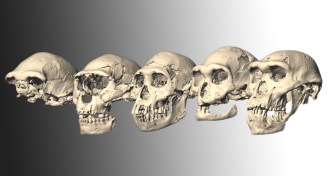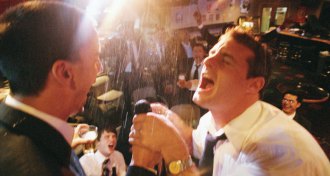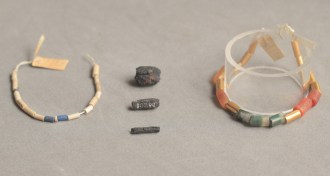
Bruce Bower has written about the behavioral sciences since 1984. He often writes about psychology, anthropology, archaeology and mental health issues. Bruce has a master's degree in psychology from Pepperdine University and a master's degree in journalism from the University of Missouri. Following an internship at Science News in 1981, he worked as a reporter at Psychiatric News, a publication of the American Psychiatric Association, until joining Science News as a staff writer. In 1996, the American Psychological Association appointed Bruce a Science Writer Fellow, with a grant to visit psychological scientists of his own choosing. Early stints as an aide in a day school for children and teenagers with severe psychological problems and as a counselor in a drug diversion center provided Bruce with a surprisingly good background for a career in science journalism.

Trustworthy journalism comes at a price.
Scientists and journalists share a core belief in questioning, observing and verifying to reach the truth. Science News reports on crucial research and discovery across science disciplines. We need your financial support to make it happen – every contribution makes a difference.
All Stories by Bruce Bower
-
 Anthropology
AnthropologyFossil skull points to single root for human evolution
New find suggests that humankind’s origins trace to an ancient species that spread from Africa to Asia.
-
 Anthropology
AnthropologyAncient farmers, foragers kept genes to themselves
Ancient DNA and diet clues suggest how farmers and hunter-gathers contributed to modern Europeans’ genetic profiles.
-
 Psychology
PsychologyReading high-brow literature may aid in reading minds
Think of it as the bookworm’s bonus: People who read first-rate fiction become more socially literate, at least briefly, a new study suggests.
-
 Anthropology
AnthropologyAncient farming populations went boom, then bust
Agriculture’s introduction led to big falls as well as rises in numbers of Europeans.
-
 Psychology
PsychologyMental rotation gears up by age 5 for both boys and girls
Kid-friendly test suggests that the ability to visualize objects from different angles starts early.
-
 Psychology
PsychologyPoker pros’ arms betray their hands
Top players' arm motions when betting provide clues to whether or not they hold strong cards.
-
 Psychology
PsychologyBad acts spark a ‘cheater’s high’
Committing low-stakes acts of dishonesty enhances perpetrators’ moods.
-
 Humans
HumansBabies perk up to sounds of ancient hazards
Evolution has primed infants to focus on noises linked to longstanding dangers, a new study finds.
-
 Humans
HumansThe Tune Wreckers
People who can’t carry a tune, or can but think they can’t, are a rich resource for researchers studying musical ability.
-
 Psychology
PsychologyPoverty may tax thinking abilities
Scarce funds reduce mental abilities of U.S. shoppers and Indian farmers, experiments suggest.
-
 Psychology
PsychologyBehavioral research may overstate results
'Soft' sciences inflate support for what scientists expected to find, data check suggests.
-
 Astronomy
Astronomy‘Space beads’ push back origins of iron working
Ancient Egyptians used advanced techniques to make beads out of 'metal from the sky.'